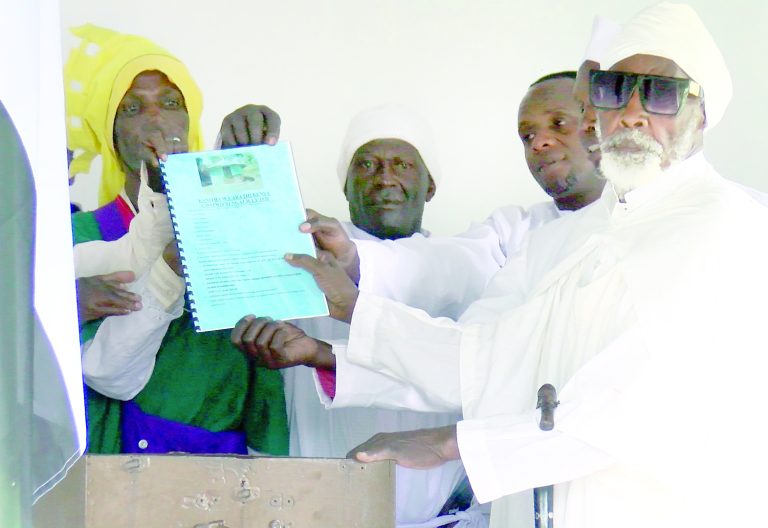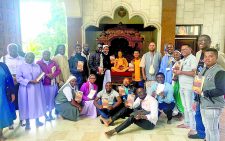Keeper of divine edicts of Akurinu, over 90 years on

At the heart of Kangema in Ihigaini village stands a shrine which is deemed to be the root of the Akurinu sect. The shrine holds the holy laws that are believed to be the pillars of the sect, which has been in existence for close to a century.
The written text is said to have been originally authored by the founders of the denomination through the inspiration of the Holy Spirit and they wanted the laws passed to the future generations.
James Thuo has been the custodian of the laws, passed down to him by his father who was among the six men who wrote the scroll.
The six, Henry Maina, Isaiah Kagwanja, Erastus Warii, Joseph Ng’ang’a, John Mang’ara and Samuel Maina are said to be the founders of the Akurinu sect back in 1930. According to Thuo, who is the lead priest in the sect, an unidentified man who had come from the coast met Maina and Mang’ara in Mang’u in Kiambu, and told them he had a message from God that they should spread to the world.
They were told to pick specific people who would be art of the mission. Warii was appointed to be the leader of the group and oversaw the scribbling of the laws, by dictating them to Maina who was literate.
“My father wrote the holy laws and he was entrusted to keep them and he built a shrine at home where he kept them and they remain here to date,” Thuo explains.
According to him, the six men then proceeded to the mountain (Kirinyaga), which is also called the mountain of God, where they believed they would meet God. The journey took them several months.
Vision keepers
“They were being directed through visions on where to go, what to do and the people to go to and they found things as they had been told,” he says.
The nature of the revelations gave rise to the names Aroti (seers) and Anabii (prophets). He says to date the Holy Spirit still uses the visions to communicate to them and they pass it to the people.
However, the unity of the founders did not last long as each sought to start and propagate his own sect leading to a break-up. Thuo took over the custody of the scroll from his aging father (Maina) in 1969 after being appointed by the Akurinu council though at this time he was too young to comprehend its meaning.
Years later Thuo saw the original scroll was wearing out and decided to rewrite them on a better volume, a task that took him seven days.
“I found it necessary to write the laws on a better handbook to help keep it longer for the future generations,” he added.
Today he jealously guards them saying they are the laws that guide the sect and stipulate how the followers should conduct themselves.
With the help of other members, they have made a permanent temple (bottom left) where the handbook is kept and one can only be allowed to enter after a cleansing ceremony.
“We consider this a holy place because it’s where the laws given by God are kept” he remarked.
Thuo says even though the founders of the denomination are long gone, he feels he has the obligation to bring together the splinter groups and unite them into one.
“There are so many splinter groups who claim to be the original Akurinu but they are not because we are the only ones who have the commandments given to our fathers,” he insists, adding however that the temple is open to other denominations since the main aim is to guide people into leading godly life
Treasured spot
Simon Mwaura learnt about the shrine a few months ago. Though Mwaura is not a follower of the Akurinu sect, he has been giving a helping hand in managing the temple
To him this is a treasure that should be jealously guarded as it has rich history on the formation and spreading of the sect in the country, adding that he is also eager to learn more about the laws.
Such laws, he says, play a vital role in ensuring the stability of the denomination that has a direct impact on the society.
“These are the guidelines on how the members of the denomination should lead their lives following the Christian teachings,” says Mwaura.
He sees the temple as a treasure that should be used as a learning centre for religious purposes and open to all denominations. James Gachuru, another follower of the denomination says that to date, the Holy Spirit speaks to the members through visions and that why the name Aroti still holds.
Gachuru says the laws have been very key as the members are sure to follow them to the letter. He also says this indicates that the denomination is a true religion that follows Christian teachings.
“Just like our fathers were inspired by the Holy Spirit to write the laws, today even today the divine messages come to us through visions,” he says.















